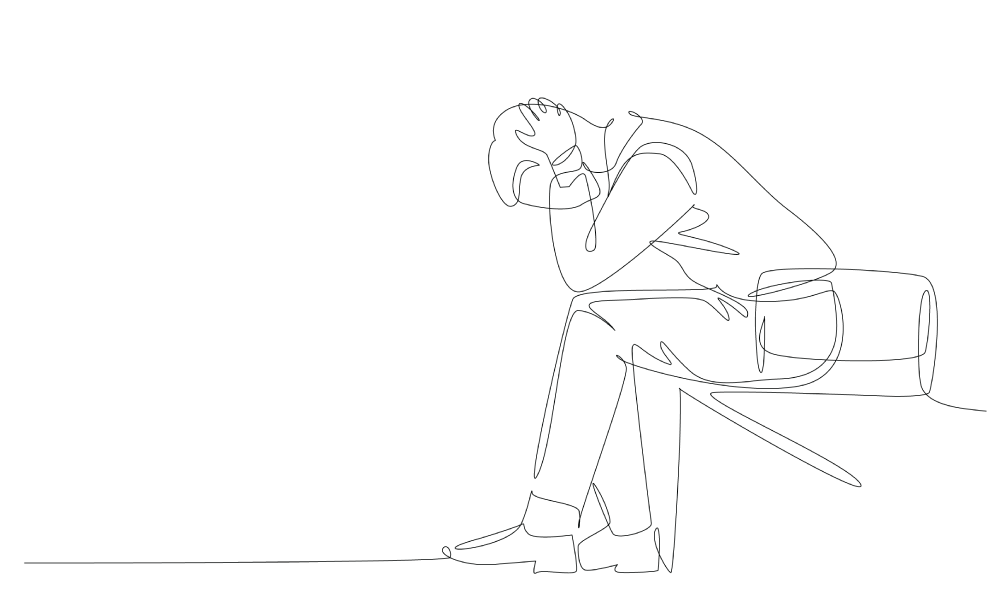Weed Withdrawal

Editorial Oversight by Leah Zuroff, M.D., M.S.

When you smoke a lot or very frequently, your body eventually becomes used to having marijuana on board around the clock. You may have noticed that the same quantity of marijuana doesn’t have quite the same effect or high as it previously did, which pushed you to use more. Therefore, when you stop smoking, you are likely to experience some symptoms of withdrawal, as your body will be unaccustomed to the absence of the drug’s effects in your system. Your personal experience with withdrawal is highly influenced by how much you have used, how long you have used, and many other biological and psychosocial factors. Being familiar with the many possible symptoms of marijuana withdrawal and when they are likely to occur is important so that you aren’t caught off guard when your experience is slightly different from what you have read about or heard from others.
Importantly, while marijuana withdrawal can be physically and mentally uncomfortable, it is not life-threatening, and will eventually go away on its own, although the duration and severity will vary from person to person. Eventually, withdrawal will give way to the new goals-met and emotional triumphs that come with viewing life through a clearer lens.
What Causes Marijuana Withdrawal?
Marijuana withdrawal is the body’s reaction to a sudden decrease in its baseline level of marijuana. From a simplistic biologic explanation, this means that the cell receptors and pathways that are normally always tuned to ‘high’ are suddenly turned to ‘low’. A good example of this leaving a loud concert and noticing that everything sounds muffled. While at first, you might be worried that you’ve suddenly gone deaf, your hearing eventually returns, and the ambient noises of daily life return to their normal volume.
Marijuana withdrawal is a similar process, in which constant weed use causes your body to eventually stop responding to the same levels that it used to. A sudden drop in that level leads to unpleasant symptoms from signaling pathways that suddenly devoid of a stimulus. The precise symptoms of marijuana withdrawal-anxiety, restlessness, irritability, shaking, sleep disturbance, and more—have to do with the complex receptor interactions and pathways marijuana acts through. Similarly, the timing of these symptoms, and how long they last, can be traced to the pharmacology of marijuana’s duration of effect in the body, and how long it takes for the brain to recover.
Neurobiology of Withdrawal
If you are a heavy user who has recently stopped using marijuana, you may be wondering why you feel so terrible, or feel tempted to use again in order to alleviate your symptoms. Understanding the neurochemistry that underlies withdrawal—while it won’t directly address your symptoms—can at least provide insight into why you’re feeling this way. More importantly, it argues for why returning to cannabis would only set you back at a biologic level.
Marijuana’s primary psychoactive components, THC, effects multiple systems in the body, but has most of its effects in the brain and nervous system, where it binds to signaling proteins on the cell surface called cannabinoid receptors (CB1 and CB2). CB1 is primarily expressed in the brain, while CB2 is found on peripheral nerves, and immune cells. Your body naturally produces a number of molecules that bind and signal through these receptors and are collectively referred to as the endogenous cannabinoid system. While much of the science remains to be investigated, the endogenous cannabinoid system is thought to function in the maintenance of sleep, appetite and memory, amongst other important cognitive functions.
THC, the primary component of marijuana, is similar in structure to the body’s natural or endogenous cannabinoids. When you smoke, THC binding to the cannabinoid receptors stimulates a complex series of changes that creates the experience of being high. Smoking consistently means constant THC-induced stimulation of CB receptors. Over time, your body’s natural protective mechanism is to decrease or downregulate the number of CB receptors on cells. This process is known as desensitization. When you quit, the THC that was once constantly present is suddenly removed, leaving only your endogenous cannabinoids to signal through a diminished number of CB receptors. Withdrawal symptoms are the direct result of dampened ECS activity in the body, which manifests as dysregulations in sleep, mood, appetite, and other bodily functions. The combination of these symptoms creates the cannabis withdrawal syndrome.
Rest assured, though, these changes are not permanent. In fact, withdrawal symptoms signify that your brain is re-equilibrating back to baseline. Although it may be tempting to smoke to alleviate these symptoms in the short-term, it would ultimately be a setback to all the progress both you and your brain have made so far, so stay strong.
Brain Changes After a Period of Abstinence
After several weeks, your brain will adapt to the absence of marijuana, and your withdrawal symptoms will eventually disappear. Once again, just knowing the science to back up this promise can help you stick with abstinence when your withdrawal symptoms are at their worst.
With chronic exposure to a drug, the receptors it signals through become less abundant, in a process known as desensitization. In the brain, CB1 and dopamine receptors that are involved in feelings of reward become desensitized which chronic THC use. In rat experiments, however, cessation of THC leads to complete reversal of desensitization within 4-6 weeks, with levels of CB1 and dopamine restored to their pre-cannabis levels (Tournier, Behav Res, 2016). Similarly, restoration of CB1 receptor levels are also seen in humans after 4 weeks of abstinence (Hirvonen, Mol Psychiatry, 2012). While 4 weeks may seem like an eternity, these reversals in CB1 receptor availability can actually be detected on brain imaging within just 2 days and continue to increase over time (D’Souza, Biol Psychiatry Cogn Neurosci Neuroimaging, 2016)!
The molecular changes that are happening at the level of the brain during withdrawal translate into what you experience during withdrawal. After quitting, you may feel slowed, foggy, or have difficulty remembering things, but don’t despair! These symptoms, along with other symptoms are withdrawal, are only temporary. Many studies have demonstrated that chronic cannabis users perform more poorly on various cognitive and memory tests. Yet, even heavy cannabis users who have worsened cognitive performance while actively using will eventually return to their baseline cognitive performance after they achieve abstinence (Tate, Addiction, 2011; Meier, Addiction, 2018). Although it may not feel like it just now, just know that you will eventually feel normal again, although it takes some time. The science has your back.
What to Expect: What Marijuana Withdrawal Feels Like
The symptoms of marijuana withdrawal can vary significantly from person to person, and are influenced by how much you use, how often you use, and a host of other personal factors. Even so, knowing what to anticipate may help further reduce any added stress that may accompany the dread of withdrawal. Importantly, it should also raise alarm bells if some symptoms lasting longer than expected, or if they are not showing signs of improvement.
Approximately 30% of regular cannabis users will experience some kind of withdrawal symptom on cessation of use (Werneck, CNS Drugs, 2018). There is finally increasing awareness that marijuana withdrawal is more than ‘just anxiety’. In a study of 1,527 cannabis users (Livine, Drug Alc Depend, 2019), the most common side effects experienced post-cessation were as follows:
- Nervousness/anxiety (76.3%)
- Hostility (71.9%)
- Sleep difficulty (68.2%)
- Depressed mood (58.9%)
There are several important takeaways from these numbers. First, don’t be surprised if you find yourself experiencing multiple withdrawal symptoms. Second, the most common symptoms of withdrawal affect your mood, thoughts, and behavior. Withdrawal symptoms like anxiety, depression, and boredom are consequently major reasons for relapse. To read more about the most common withdrawal symptoms, why they happen, and how to deal with them, jump to Most Common Withdrawal Symptoms. If and when you begin to experience distress from withdrawal-related anxiety or depression, remind yourself of the neurobiology of withdrawal. It’s just your brain actively working to re-equilibrate.
Other common symptoms of marijuana withdrawal:
- Cognitive/Emotional Changes
- Slowed Thinking, or ‘Brain Fog’
- Changes in Libido
- Boredom
- Restlessness
- Physical Symptoms
- Diffuse abdominal pain
- Decreased appetite or weight loss
- Nausea, vomiting/GI Upset
- Headaches
- Night sweats
- Shakiness/tremors
As if feeling nervous, down, and irritable weren’t enough, you may also find yourself experience physical effects of marijuana withdrawal. In the first days after quitting, you may feel vague abdominal pains, loss of appetite, or other types of GI upset. Headaches, shakiness, fevers, and night sweats have also been reported. Fortunately, physical symptoms of marijuana withdrawal are much less common than behavioral and emotional symptoms. It is important to emphasize that these symptoms are transient, and typically, do not reflect anything physically wrong or indicate some other physical illness. In contrast to other substances of abuse, particularly alcohol and other benzodiazepines, physical symptoms of marijuana withdrawal are not life-threatening, and will eventually pass without the need for medical intervention. All that being said, just know that we hear your suffering and we acknowledge your pain. The discomfort of now is real, but temporary.
Marijuana Withdrawal Posts from The Weedless Blog
What is Cannabis Withdrawal Syndrome?
Before the 1990s, many doubted that cessation of marijuana could lead to similar symptoms of withdrawal seen with other drugs. However, as marijuana use began to rise over the next two decades, more patients began to seek treatment for marijuana-related disorders, including cognitive deficits, psychosis, and dependence. Based on support from neurobiological, clinical, and epidemiological studies, cannabis withdrawal syndrome (CWS) was added to the Diagnostic and Statistical Manual of Mental disorders (DSM-5) in 2013.